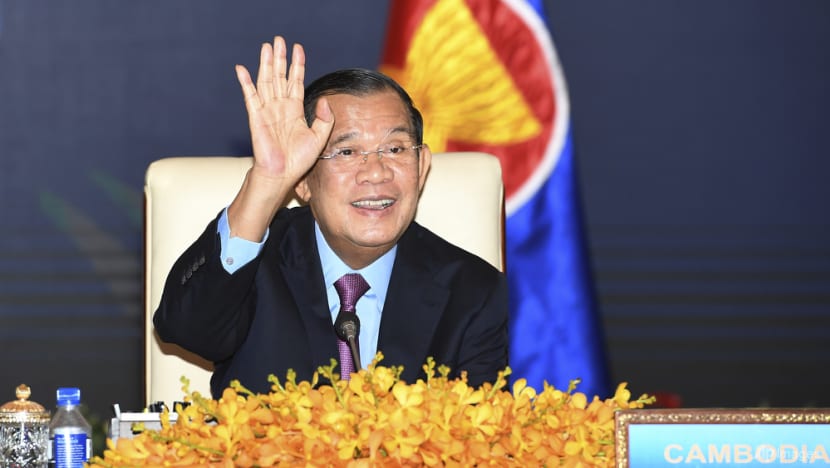Commentary: Is Cambodia up to the task of chairing ASEAN?
Cambodia has taken the reins for ASEAN leadership for 2022, a year that will be defined by its handling of the Myanmar crisis, as well as foreign engagement in an increasingly multipolar world order, says a researcher.

TOKYO: In October 2021, Sultan Bolkiah of Brunei handed over the chairmanship of ASEAN to Cambodian Prime Minister Hun Sen.
In 2022, ASEAN will continue to be preoccupied with Myanmar’s political crisis and the international community’s criticism on the issue. ASEAN has taken modest but unrivalled measures in this regard.
The ASEAN Summit on Apr 24, 2021 issued a Chairman’s Statement, which implemented the "Five-Point Consensus" on the situation in Myanmar, inviting "non-political representatives" and refusing the attendance of Myanmar’s Senior General Min Aung Hlaing to the 38th and 39th concurrent ASEAN Summits.
In response, Myanmar was absent from these ASEAN Summits and the ASEAN–China Special Summit to commemorate the 30th anniversary of ASEAN–China Dialogue Relations, despite China’s lobbying.
Myanmar also remained absent from other meetings, including the 13th Asia Europe Meeting chaired by Cambodia. If ASEAN organisers stand by their decision of requiring Myanmar attendees to be non-political figures, disharmony is likely.
Thailand and Cambodia — who have both previously taken conciliatory positions vis-à-vis Myanmar — have aligned with other ASEAN countries and criticised Myanmar for its absence at ASEAN-related meetings.
Hun Sen also appears to be seeking to engage in dialogue with Myanmar’s junta just before the ASEAN chairmanship rolls around.
DIALOGUE WITH THE JUNTA
Myanmar’s foreign minister visited Cambodia on 6 and 7 December while Hun Sen travelled to Myanmar on 7 January for further meetings and became the first foreign leader to grace Min Aung Hlaing’s junta government with an official state visit.
Moreover, Hun Sen said junta officials should be invited to ASEAN meetings and he named Cambodian Foreign Minister Prak Sokhonn to be ASEAN’s next special envoy to Myanmar.
This reveals that Cambodia is uncomfortable with Myanmar’s absence, as well as its leadership as chair in maintaining harmonisation. If Cambodia succeeds in persuading the junta into returning, there is a chance that ASEAN countries may accept the initiative.
Some experts have regarded these actions by Hun Sen highly. The ASEAN Foreign Ministers’ Retreat, scheduled for 18 and 19 January, has been postponed but there seems to be a split among ASEAN members on whether to accept the Junta to ASEAN meetings.
Cambodia, Indonesia (which has taken a proactive stance on the issue) and Thailand (which has played a mediating role between Myanmar and ASEAN) will be key players in 2022.
The ASEAN country coordinators are the most "privileged" of the ASEAN external parties and act as mediators between ASEAN dialogue partners in rotation as stipulated in Article 44 of its Charter. "Privileges" include attending Annual Foreign Ministers’ Meetings and other ministerial engagements.
These meetings risk losing their value if non-ASEAN countries do not see them as useful, but for now they seem to be alive and well.
FOREIGN ENGAGEMENT
Indeed, the United Kingdom sought to become an ASEAN dialogue partner after withdrawing from the European Union.
It has not yet been announced which country will be responsible for coordinating the ASEAN–UK partnership in 2022. Through the use of dialogue partners and country coordinators, ASEAN is trying to maintain its centrality.
Coordinators were rotated in July 2021, the current period lasting until June 2024. Of these, Myanmar, the new country coordinator for China, deserves the most attention.
It is not only Myanmar’s relationship with China that is noteworthy, but also whether it will be able to manage ASEAN countries and China. If Myanmar and Cambodia as chair both act in favour of China, the unity of ASEAN may itself be further eroded.
The closer ASEAN members are perceived to be to China, the more reason there is for the United States and other powers to engage in "strategic competition" in the region.
HANDLING THE PANDEMIC
Despite uncertainties regarding Cambodia’s ability to chair ASEAN, it is managing COVID-19 relatively well. This could be a good opportunity for Cambodia to focus on running the ASEAN chairmanship.
The number of infected cases are low, and as of early January, approximately 88 per cent of the Cambodian population has been vaccinated — ranking behind only Singapore among ASEAN countries.
Lifting COVID-19-related restrictions from mid-November has also contributed to a brighter GDP outlook for 2022.
Cambodia’s COVID-19 response has also had negative effects. The Cambodian government has taken advantage of the pandemic to implement new restrictive laws to control dissent.
In November 2021, Hun Sen stated that he would do whatever it takes to crack down on any protests during Cambodia’s ASEAN chairmanship; some have interpreted this as a ‘warning’ to dissidents in the country.
When Cambodia last chaired ASEAN in 2012, it failed to issue a joint statement for the first time. The South China Sea issue that led to this failure also continues to be a major problem not only for the claimant states but also for ASEAN as a region.
It is difficult to say that there has been significant progress in the negotiations for a Code of Conduct (COC) in the South China Sea issue in the last decade.
While some ASEAN members see 2022 as a milestone year for the conclusion of the COC, a Cambodian think tank has expressed scepticism about this prospect.
Hun Sen has already blocked criticism of the progress of COC negotiations, and it is unlikely that there will be any significant progress in 2022.
As "the closest of the ASEAN members to China", it may be a plausible plan for Cambodia to try to keep the issue out of the headlines and instead focus the spotlight on the Myanmar issue.
Riko Watanabe is a postgraduate student at the Graduate School of Asia-Pacific Studies, Waseda University. This commentary first appeared on the East Asia Forum.


















